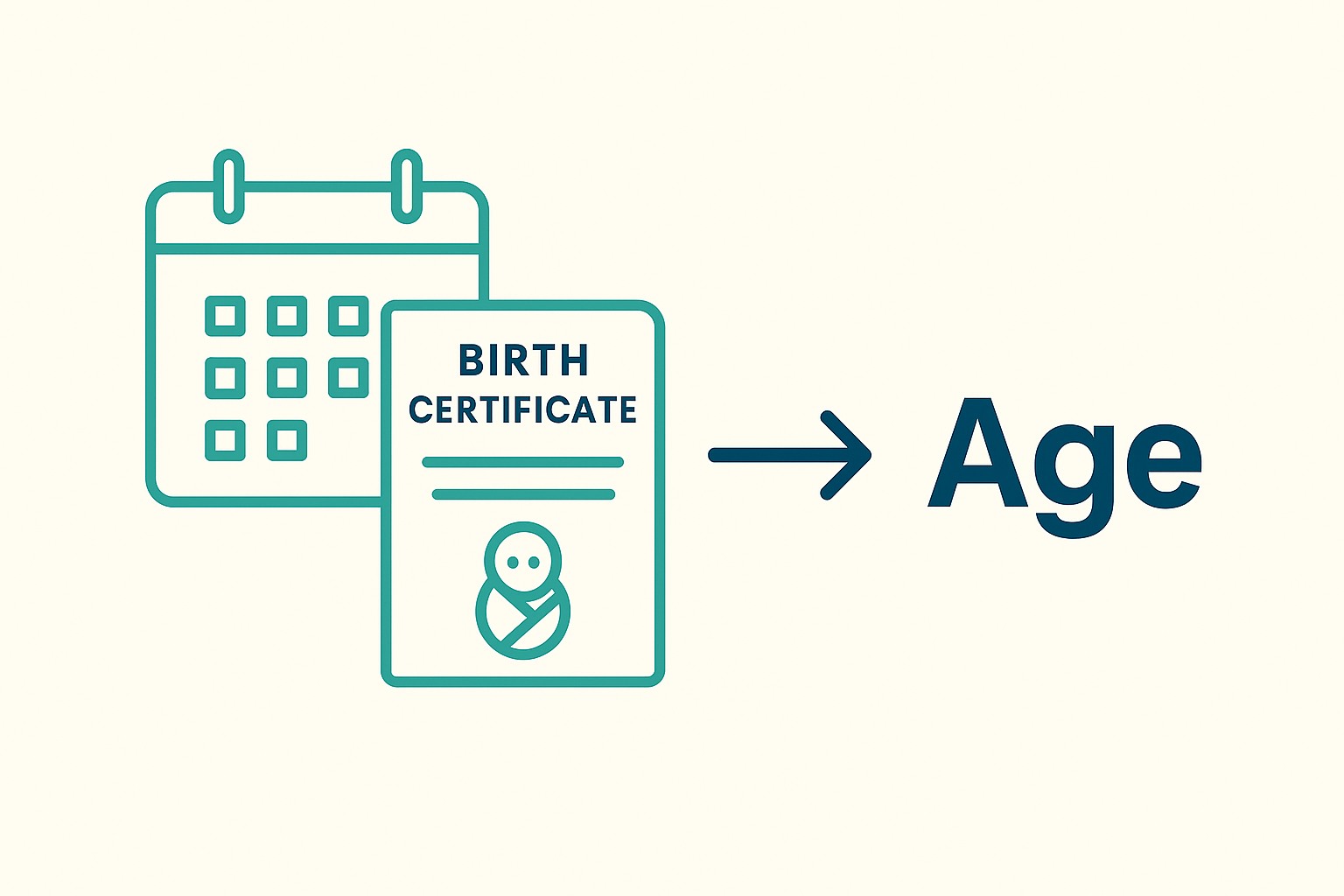Get Age From Date of Birth: A Comprehensive Guide

Get Age From Date of Birth: A Comprehensive Guide
Calculating someone's age from their date of birth might seem simple, but it can involve nuances depending on the context and the tools you're using. This guide provides a comprehensive overview of how to accurately get age from date of birth, covering manual methods, spreadsheet formulas, programming solutions, and addressing common pitfalls.
Why Calculate Age From Date of Birth?
Knowing how to reliably get age from date of birth is crucial in various scenarios:
- Legal and Administrative Purposes: Determining eligibility for certain activities, services, or benefits often relies on age.
- Demographic Analysis: Understanding age distributions is vital for research, policy-making, and marketing.
- Personal Record Keeping: Accurately tracking age is essential for family history, medical records, and personal organization.
- Software Development: Applications frequently require age calculations for user profiling, data analysis, and personalized experiences.
Manual Calculation: The Basics
The simplest way to get age from date of birth is through manual calculation. Here's the basic process:
1. Determine the Current Date: Know the exact date for which you want to calculate the age. 2. Subtract the Birth Year from the Current Year: This gives you the initial age. 3. Check the Month and Day: If the current month is after* the birth month, the initial age is correct. If the current month is the same as the birth month, check the day. If the current day is on or after* the birth day, the initial age is correct. If the current month is before the birth month, or the current day is before* the birth day in the same month, subtract 1 from the initial age.
Example:
- Birth Date: March 15, 1990
- Current Date: July 20, 2023
- Year Difference: 2023 - 1990 = 33
- Since July is after March, the age is 33.
Another Example:
- Birth Date: December 28, 1985
- Current Date: October 10, 2023
- Year Difference: 2023 - 1985 = 38
- Since October is before December, the age is 38 - 1 = 37.
Using Spreadsheet Software (Excel, Google Sheets)
Spreadsheet software offers built-in functions to easily get age from date of birth. Here's how to do it in Excel and Google Sheets:
Excel:
1. Enter the Birth Date: In cell A1, enter the date of birth (e.g., 1990-03-15). Ensure the cell is formatted as a date.
2. Use the DATEDIF Function: In cell B1, enter the following formula:
=DATEDIF(A1,TODAY(),"Y")
* A1: The cell containing the birth date.
* TODAY(): Returns the current date.
* "Y": Specifies that you want the difference in years.
Google Sheets:
The process is identical to Excel. Use the same DATEDIF function:
1. Enter the Birth Date: In cell A1, enter the date of birth (e.g., 1990-03-15). Ensure the cell is formatted as a date.
2. Use the DATEDIF Function: In cell B1, enter the following formula:
=DATEDIF(A1,TODAY(),"Y")
Explanation: The DATEDIF function calculates the difference between two dates based on a specified interval (in this case, years). TODAY() dynamically updates the current date, ensuring the age is always current.
Programming Solutions: Code Examples
Many programming languages provide libraries and functions to get age from date of birth. Here are examples in Python and JavaScript:
Python:
`python
from datetime import date
def calculate_age(birth_date): today = date.today() age = today.year - birth_date.year - ((today.month, today.day) < (birth_date.month, birth_date.day)) return age
Example Usage
birth_date = date(1988, 5, 10) # Year, Month, Day
age = calculate_age(birth_date)
print(f"The age is: {age}")
Explanation:
- The
datetimemodule is used to work with dates. - The
calculate_agefunction takes adateobject as input. - It calculates the age by subtracting the birth year from the current year and adjusting if the birth month/day hasn't occurred yet in the current year.
JavaScript:
`javascript
function calculateAge(birthDate) {
const today = new Date();
const birth = new Date(birthDate);
let age = today.getFullYear() - birth.getFullYear();
const month = today.getMonth() - birth.getMonth();
if (month < 0 || (month === 0 && today.getDate() < birth.getDate())) {
age--;
}
return age;
}
// Example Usage
const birthDate = '1995-08-22'; // YYYY-MM-DD
const age = calculateAge(birthDate);
console.log(The age is: ${age});
`
Explanation:
- The
Dateobject is used to represent dates. - The
calculateAgefunction calculates the age similarly to the Python example, adjusting for the month and day.
Handling Different Date Formats
Date formats vary across the globe. When you get age from date of birth, it's crucial to handle these variations correctly. Common formats include:
- YYYY-MM-DD: (ISO 8601) - Year-Month-Day (e.g., 1990-03-15)
- MM/DD/YYYY: Month/Day/Year (e.g., 03/15/1990) - Common in the United States
- DD/MM/YYYY: Day/Month/Year (e.g., 15/03/1990) - Common in Europe and other regions
When working with dates from different sources, ensure you correctly parse and interpret the format. Most programming languages and spreadsheet software provide tools to handle different date formats.
Example (Python):
`python
from datetime import datetime
date_string = "15/03/1990" # DD/MM/YYYY format birth_date = datetime.strptime(date_string, "%d/%m/%Y").date()
age = calculate_age(birth_date)
print(f"The age is: {age}")
`
Common Pitfalls and How to Avoid Them
- Incorrect Date Format: Misinterpreting the date format is a common error. Always verify the format before calculation.
- Time Zones: For precise age calculations, especially across different time zones, consider the time zone of the birth and current location.
- Leap Years: Leap years can affect age calculations, especially when calculating age in days or months. Ensure your calculations account for leap years.
- Edge Cases: Pay attention to edge cases where the current date is very close to the birth date. The age might be off by one if not handled correctly.
Conclusion
Knowing how to accurately get age from date of birth is essential in many contexts. Whether you choose manual calculation, spreadsheet formulas, or programming solutions, understanding the underlying principles and potential pitfalls will help you ensure accurate results. Remember to handle different date formats carefully and consider factors like time zones and leap years for precise calculations.